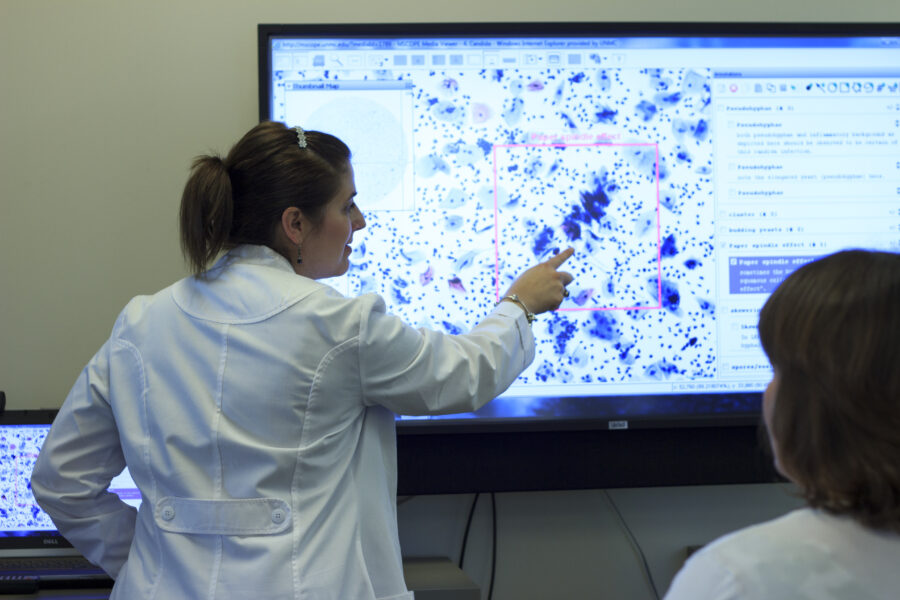Regental approval of the program enables first class to enter in fall 2022
The University of Nebraska Board of Regents approved Friday the creation of a Master of Diagnostic Cytology program within the University of Nebraska Medical Center College of Allied Health Professions. The change will be effective with the class entering fall 2022, making UNMC only the seventh cytotechnology program nationwide to offer a master’s degree.
UNMC currently has a postbaccalaureate certificate — the only cytotechnology program in Nebraska and one of 22 programs in the United States.
Cytologists assist with patient procedures called fine needle aspirations in various clinical settings and perform microscopic examinations of specially stained slides of patient samples for the purposes of diagnosing cancer, precancerous lesions, benign tumors, infectious agents and inflammatory processes.
“Consider yourself a disease detective who studies the secret lives of cells,” said program director Amber Donnelly, Ph.D.
Cytologists also assist with patient procedures called fine needle aspirations in various clinical settings.
But advances in technology and clinical best practices are driving the profession to evolve. Moving cytotechnology to a master’s-level program will ensure that UNMC’s graduates are competent to practice the newly outlined competencies of the profession, said Kyle Meyer, Ph.D., dean of the College of Allied Health Professions.
The Cytotechnology Program Review Committee (CPRC) of the American Society of Cytopathology, the American Society for Clinical Pathology and the College of American Pathologists also strongly advocates that all programs nationwide move toward awarding a master’s degree as soon as feasible.
In addition, the move to a master’s program better positions its students to apply for financial aid, in contrast to the limited funds available for those pursuing a postbaccalaureate certificate. In informal surveys, alumni of UNMC’s present certificate program overwhelmingly expressed interest in also pursuing a master’s degree at the college.
For the past 25 years, UNMC has offered a 12-month, 32 credit hour cytotechnology certificate program that has been continuously accredited by the Commission on Accreditation of Allied Health Education Programs.
The UNMC cytotechnology program has developed innovative education partnerships at eight satellite sites (see sidebar) throughout the country, allowing students to complete their program remotely.
Due to projected workforce demand and the program’s outstanding national reputation for delivering top-quality education via distance education, the number of UNMC cytotechnology students at satellite sites both within and outside the United States is expected to grow steadily over the next several years.
Clinical education components of the curriculum will take place at several approved clinical affiliate sites, including UNMC’s clinical partner, Nebraska Medicine.
Cost for the program will come from tuition and fees. No additional state funds are required to create the master’s program.
Remote learning sites
UNMC has collaborative agreements to remotely teach cytotechnology to students at the following sites:
- The Carle Foundation Hospital, Urbana, Ill.;
- University of California-Davis Medical Center;
- The Ohio State University Wexner Medical Center, Columbus, Ohio;
- BayCare Health System, in the Tampa Bay, Fla., area;
- Massachusetts General Hospital, Boston;
- Sonora Quest Labs, Phoenix;
- ProPath, Dallas;
- Spectrum Health, Grand Rapids, Mich.

Congratulations!